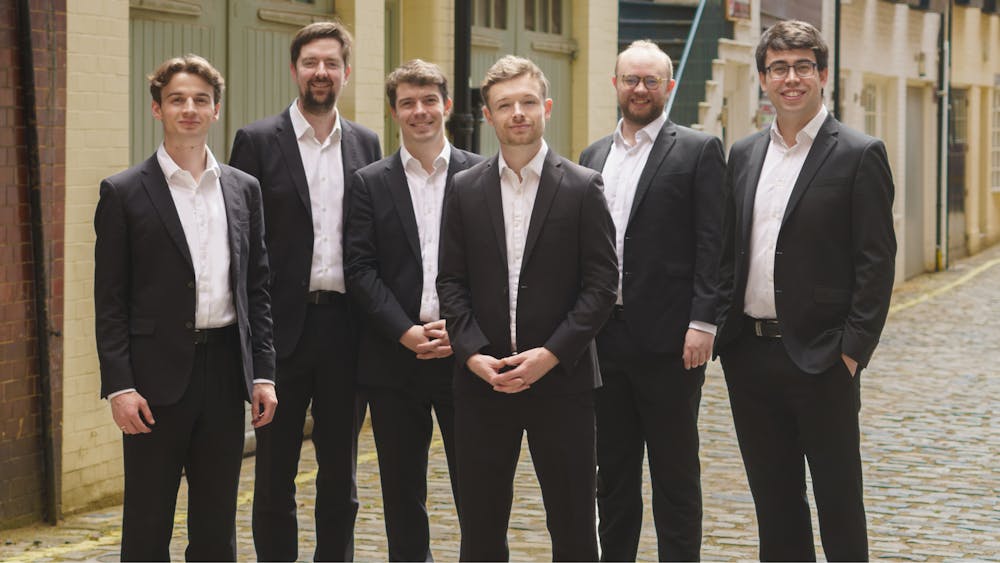If you’re a classical music enthusiast like myself, Philadelphia is the city to be.
Between the Philadelphia Orchestra, Ensemble Arts Philly, and Opera Philadelphia, there is not a dull moment during concert season. But you’ll find premier classical performances at venues other than the Academy of Music; oftentimes, you’ll find them on Penn’s own campus.
Through Penn Live Arts, The Gesualdo Six, an early music ensemble specializing in English polyphony, brought their talents to St. Mary’s Episcopal Church. The Gesualdo Six is a relatively young ensemble (having formed in 2014), one of many small, UK–based consorts focused on polyphonic performance. But their age certainly does not detract from their stage presence: The Gesualdo Six have a self–assured air about them, lending the group a somewhat smug, but nonetheless dignified demeanor that imposes and impresses. This can at times make it difficult to enjoy their performance; The Gesualdo Six relish so much in their program that one ends up feeling a bit left out on the joke.
There’s little else to complain about, however, because their sound as a group is near perfect: resonant, round, and well–blended, The Gesualdo Six maintain a beautifully warm texture that distinguishes them from other ensembles of the genre. While I tend to prefer the precise, slightly more conservative approaches of groups such as VOCES8 or Chanticleer, I found myself in awe of The Gesualdo Six’s unique ability to combine full singing akin to that of a larger modern choir with the creamy blend of an early music ensemble. At opportune moments throughout the concert, each individual voice emerged from the texture and assumed the lead.
Opening with a solo was Joseph Wicks, the pitch for the group and The Gesualdo Six’s second tenor. He, countertenor Alasdair Austin, and baritone Michael Craddock stole the show with their expressivity and wonderful tones of voice. Austin was exceptional for the plain fact of his beautifully pure and gentle countertenor range, but it was Michael Craddock that seemed the unsung hero of Thursday night. Besides the briefest of solos in the first half of the concert, Craddock got little time to shine, but his baritone line did not falter once, and he continuously made intelligent phrasing choices that nicely framed the voices of his colleagues. During the brief solo he did perform, I noticed the intriguing quality of his tone—he possessed a somewhat rough but nonetheless graceful voice that I listened for during the rest of the night.
Beyond the individual voices and the excellent blend, the sheer theatricality of the night's performance was a delightful surprise. Because most of the songs The Gesualdo Six performed that night were not six–part pieces, they alternated which members were performing, leading to a visual rearrangement after nearly every piece. The ensemble would also move around in the venue depending on their desired sound. They started the night off, for example, with a call and response chant featuring soloist Joseph Wicks. Wicks stood on the stage, alone, and sang a simple melody, which was then echoed from the back of the church by the rest of the ensemble responding from the rafters. The result at first gave an eerie impression that Wicks’ voice was bouncing powerfully off the back walls of the church. Several variations of this arrangement occurred throughout the night, and I found myself appreciating these small liberties taken to perfect the acoustics and ambiance, which make all the difference in a choral performance.
As I left the church that night, I stopped to speak briefly with The Gesualdo Six’s director, Owain Park. He smiled warmly at me as I approached him, shook my hand, and babbled happily for a few minutes about his choice of repertoire and what directing the ensemble is like. I was struck with the great zeal that Park holds for early polyphonic music, evident in both the ensemble’s performance and our brief conversation. I reflected on this as I left the church that night.
Though at times their performance came off as abrasive or overeager, The Gesualdo Six clearly have a deep love for the music they perform. It’s wholesome, and it has resulted in a deeply admirable level of mastery. Park and his colleagues’ obvious love for English polyphony reminded me of a truth foreign to many Penn students: oftentimes, the key ingredient to success is passion. Their love for the work they do is the best thing about Gesualdo Six, and I left their concert feeling hopeful about my and my fellow student’s chances at finding a career we love. If Gesualdo Six can do it, we can, too.

